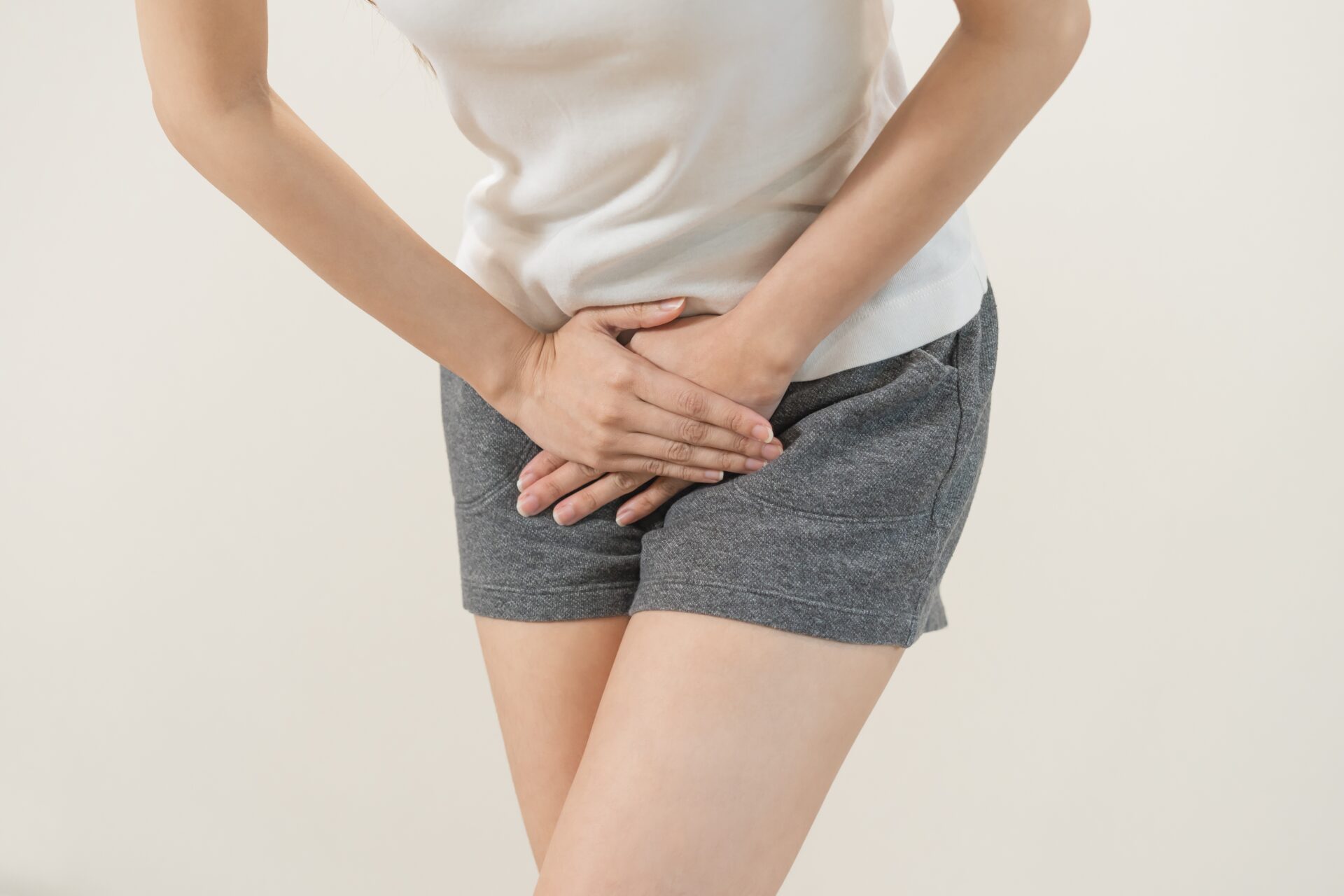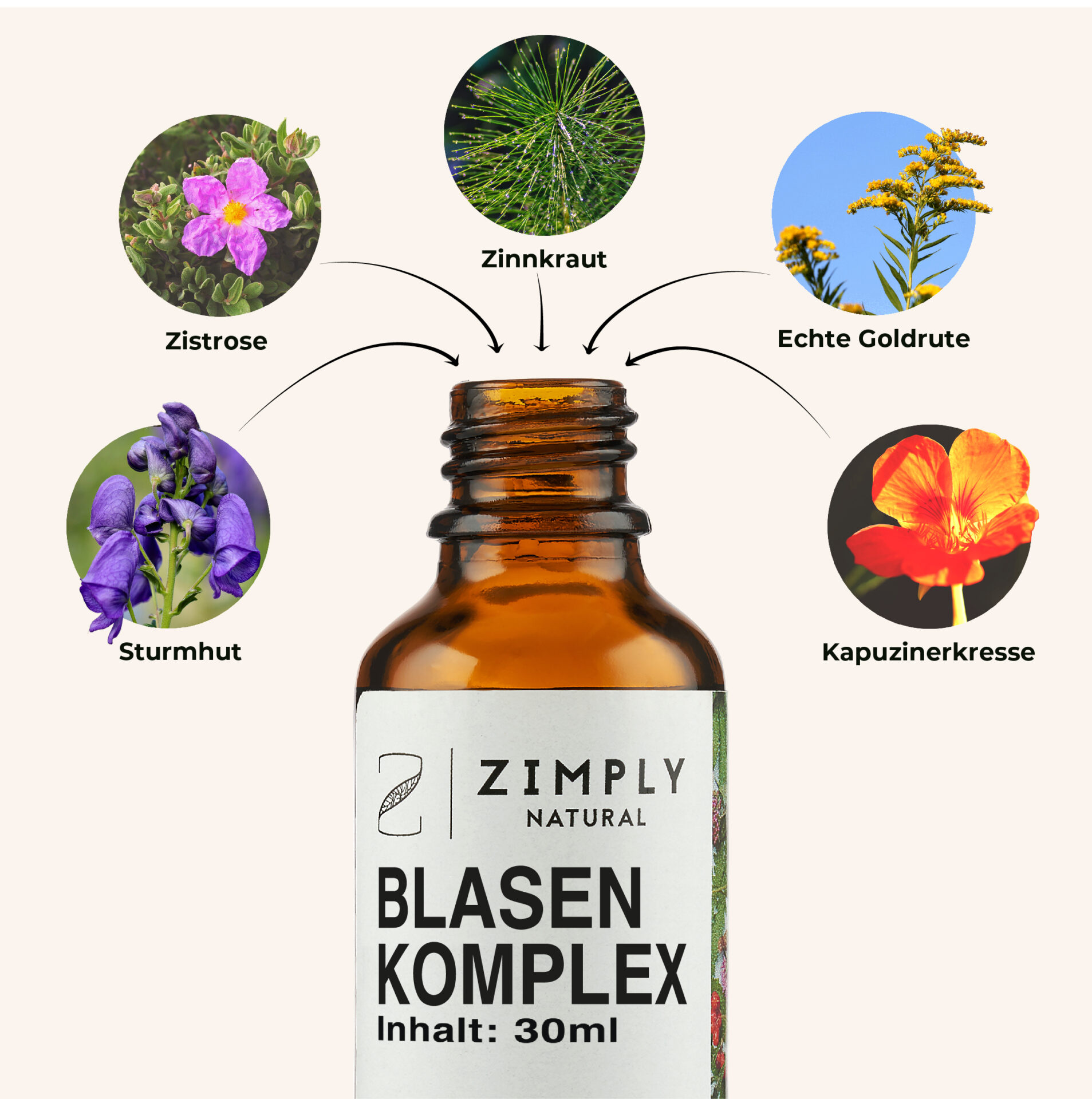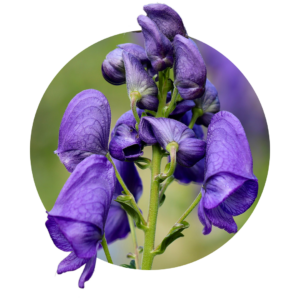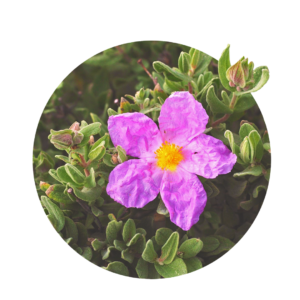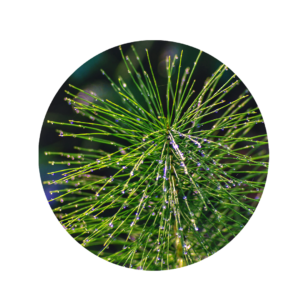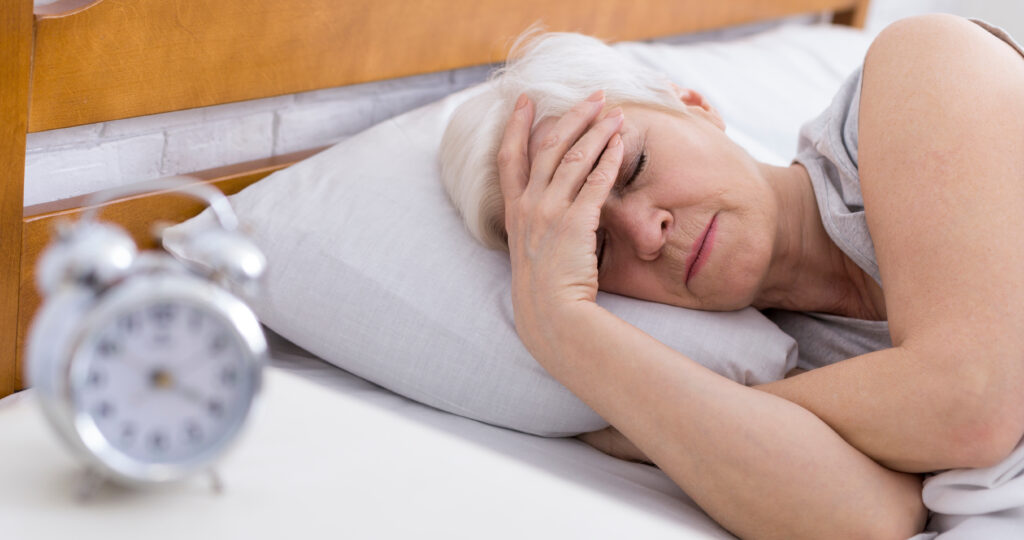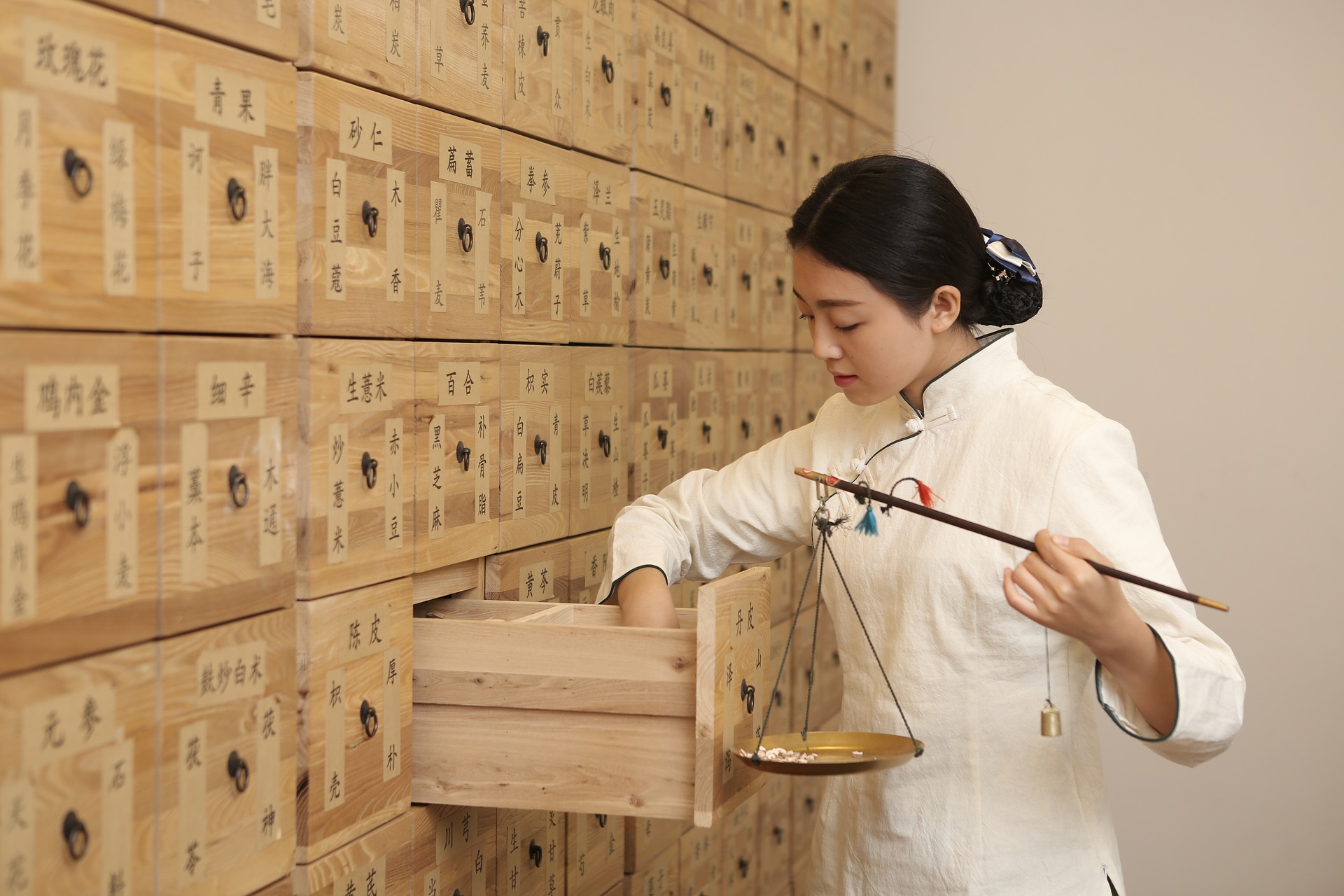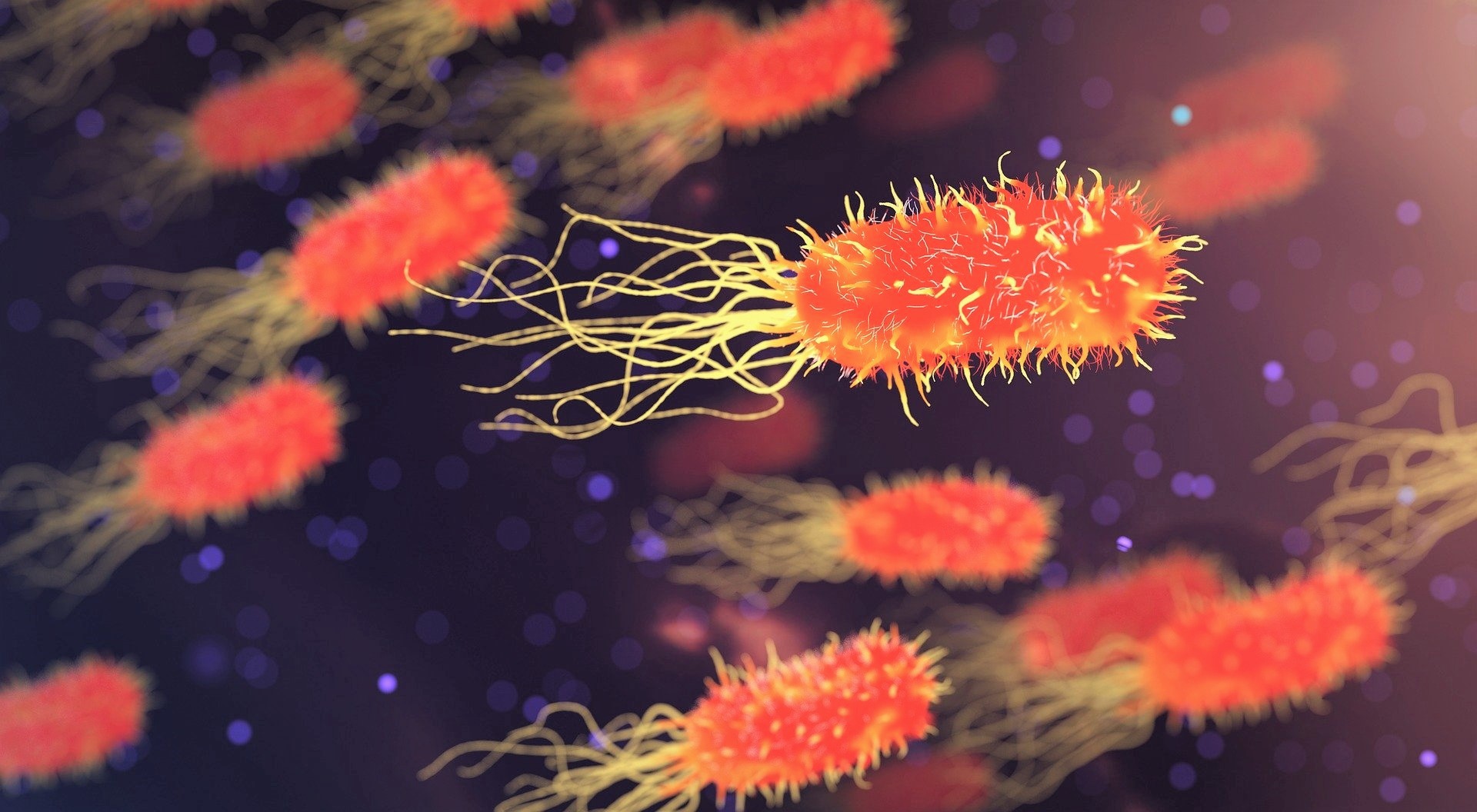More than every second woman is affected by cystitis at least once in her life. This painful illness can occur sooner than you think and can also drag on for longer periods of time. What's more, it often comes back again and again. But what is the reason for this and how can you counteract it naturally? Natural remedies and much more in this blog post.
With natural methods, such as the individual spagyric mixtures from Zimply Natural, your complaints can be relieved naturally and sustainably.
Table of contents
- What actually is cystitis?
- How a bladder infection can develop
- These are the typical symptoms of cystitis
- How you can fight your bladder infection naturally
- You can prevent bladder infections with these measures
- Why you are affected by cystitis more often than other women
- These medicinal plants can help to alleviate the symptoms of your bladder infection
- Zimply Natural - Your natural help for cystitis
- FAQ: Questions and answers on the topic Cystitis
What is cystitis actually?
Almost everyone has had a bladder infection at some point in their life. They are painful and sometimes take longer to heal. But how does this inflammatory disease actually occur? Cystitis is an inflammation of the bladder that is usually caused by bacteria. As a rule, these bacteria enter the bladder through the urethra and adhere to the bladder wall. If they multiply and the body's defense mechanisms fail, an inflammation develops. But what options do you have to counteract this disease naturally? In this blog post, we'll tell you exactly that and everything else you need to know about bladder inflammation.
That women are more susceptible to bladder infections after the menopause because the drop in estrogen levels makes the urinary tract more susceptible to infections?
How a bladder infection can develop
These are the most common causes of bladder infections
The most typical cause of cystitis is a bacterial infection. Bacteria from the intestine enter the urethra and finally the bladder. There they multiply and cause inflammation. Another cause can be sexual intercourse. The friction and movement can also cause bacteria, e.g. from the bowel, to enter the urethra and ultimately the bladder. It is therefore advisable to go to the toilet after sexual intercourse of any kind to empty the bladder. Another obvious risk factor for a bacterial infection is a lack of hygiene after using the toilet. This allows bacteria to get close to the urethra, which increases the risk of bladder infection.
The development and risk of cystitis during pregnancy
In women, in addition to anatomy, certain life situations, such as pregnancy, can also pose an increased risk of bladder inflammation. This is because hormonal changes and the growing uterus can be risky during pregnancy. Hormones during pregnancy can contribute to the mucous membranes becoming more sensitive, making it easier for bacteria to spread. The muscles may also relax due to the pregnancy hormones, causing the urethra to widen. This makes it easier for bacteria to enter the bladder. As already mentioned, the growing uterus is also a risk factor, as it compresses the bladder. This makes it easier for bacteria to multiply. Under normal circumstances, cystitis is not a serious illness and can be treated well. However, caution should be exercised during pregnancy. This is because cystitis can degenerate into pyelonephritis, which can also pose a risk to the unborn child.

Other risk factors for the occurrence of cystitis
Not only pregnancy, but also the menopause can pose an increased risk of bladder infections. During and after the Menopause This is because the oestrogen level drops, which can lead to the urinary tract becoming more susceptible to infections. This usually happens due to the weakening of the pelvic floor, which can facilitate the penetration and spread of bacteria. The use of certain contraceptives can also be a cause of cystitis. For example, the use of diaphragms or spermicidal contraceptive creams plays a role here. In some cases, these can negatively affect and irritate the mucous membranes of the bladder, making them more susceptible to bacteria. In addition, certain structural abnormalities or changes in the urinary tract can increase the risk of bladder inflammation. These include, for example, kidney stones or urethral strictures, as they affect the normal flow direction of urine and make it easier for bacteria to adhere.
That cystitis can also occur in children and is often caused by structural problems in the urinary tract?
These are the typical symptoms of cystitis
Typical effects of bladder infections are frequent urination and pain when doing so. You may feel the urge to go to the toilet more often than usual. You may also experience pain or a burning sensation when urinating, especially towards the end of urination. If your urine is cloudy or bloodier than usual, this also indicates an inflammation of the bladder. Your urine may also contain traces of blood. One of the most consistent symptoms is lower abdominal pain. You may experience pain or a feeling of pressure in the lower abdominal area or a general feeling of discomfort in the pelvic area. You may also feel that your bladder is not completely empty, even though you have just been to the toilet. If the bladder infection is more serious or spreads to the kidneys, it can also have more severe effects. These include fever and a general feeling of illness.
How you can fight your bladder infection naturally
Natural approaches can help you to alleviate or prevent cystitis, but they cannot cure an infection on their own. However, as prevention is half the battle, we present natural tips and approaches below. One point that is always important and beneficial is sufficient fluid intake. This promotes the flushing of the urinary tract and the elimination of bacteria. It can also alleviate the symptoms and support the healing process. The next tip, which you have probably used many times for abdominal pain, is the good old hot water bottle. This can relieve your pain and improve your general well-being. A warm bath can also work wonders to relax the muscles. Foods rich in prebiotics such as garlic, onions, leeks and oatmeal can have a preventative effect. They help to maintain a healthy intestinal flora and prevent the Immunesystem to strengthen.

That although bladder infections are more common in women, they can also occur in men?
Especially at an advanced age or in the case of structural anomalies of the urinary tract.
You can prevent bladder infections with these measures
Good hygiene and care are essential for the prevention of cystitis. This applies in particular to intimate hygiene after using the toilet. It is best to wipe from front to back to reduce the risk of bacteria transmission. It can also be helpful to change your underwear regularly. Urinating after sexual intercourse can flush possible bacteria out of the urethra, which can prevent cystitis. This is a simple rule, but it can be incredibly effective. Also, try to go to the toilet regularly and avoid holding urine in your bladder for too long. One aspect that can also play a role is wearing clothes that are too tight. This can put pressure on the bladder, which can generally lead to abdominal pain. Squeezing the bladder can also make it easier for bacteria to multiply and adhere to the bladder wall.
Why you are affected by cystitis more often than other women
Perhaps you are like some other women: You keep getting bladder infections, while many of your friends have never had one. What do you do differently to them? Well, it could actually be down to your anatomy or your genetics. You may also have certain habits that make you more prone to bladder infections. This can include, for example, excessive intimate hygiene. We mentioned earlier that this is very important and preventative, but it can also be exaggerated. Try to avoid aggressive, fragrance-rich products and use special intimate hygiene products with a lower pH value. Prolonged cold and wetness in the intimate area is also a risk factor. This can be the case, for example, if you have been swimming and then sit around in your wet swimwear for a longer period of time. This hypothermia can increase your susceptibility to infections, as can sitting on cold surfaces for long periods of time.

The application of your Blister sprays is, by the way, very simple: The spray is simply sprayed into the mouth according to the dosage instructions given on the vial. In order to achieve the best possible effect and to be able to optimally counteract the causes, we recommend use over a longer period of six to eight weeks. As a kind of cure, you spray 3×3 sprays daily.
These medicinal plants can help you with your bladder infection
Bladder infections are usually accompanied by pain and a high temperature. Both are counteracted by Aconitum napellus and helps the patient to get the inflammation under control again. It can be used externally and internally. In addition, aconite has analgesic properties. Highly diluted in oils and ointments, it is therefore used externally as an embrocation for nerve pain. The nerves are slightly anaesthetized and the pain is quickly reduced to a tolerable level.
The Cistus is antimicrobial. According to various tests, its effect is directed against viruses, bacteria and fungi. It can therefore be used successfully both internally and externally to combat skin infections and colds. It is also relaxing. In studies, the smooth muscles of the digestive system in particular have shown positive reactions to rockrose. They relaxed and digestion improved.
Skin patients should always remember the horsetail. By draining and detoxifying the tissue, it helps the skin to regenerate. On the metabolic level, it also contributes to a purification. It thus cleanses the body. Silicic acid helps to restore the structure and natural firmness of damaged skin. Horsetail should always be used internally and externally for skin problems.
Many urinary tract infections are ascending infections caused by Escherichia coli bacteria. The bacteria attack the mucous membranes and cause inflammation, which is accompanied by burning, itching, pain and a feeling of urinary urgency. The mustard oils of the Nasturtium are effective against these bacteria and kill them so that the infection is terminated and the symptoms disappear again.
Inflammation of the urinary tract is usually caused by microbial causes. Fungi or bacteria usually infect the urinary tract and cause inflammation of the mucous membranes. The Goldenrod now acts directly against these infections, kills germs and at the same time stimulates the kidneys to produce more urine. This increased amount of urine flushes the urinary tract more effectively and thus flushes out the pathogens. Fungi and bacteria are thus less able to multiply and the mucous membranes become less inflamed.
Zimply Natural - Your natural help for cystitis
With Zimply Natural, we are the antidote to painkillers, sleeping pills, and standard medications. We are your medicine! For our mixtures we use the centuries-old natural healing method of spagyric back. The Spagyric combines the herbal active ingredients and phytotherapeutic elements of the HealingplantsThe mineral salt qualities, as well as the subtle information of the medicinal plants and the energetic potential of the Bach flowers.
With natural methods, such as the individual Spagyric mixtures from Zimply Natural, your complaints can be relieved naturally and sustainably.
FAQ: Questions and answers about cystitis
Does diet play a role in the occurrence of cystitis?
Yes, diet plays a role in the risk of cystitis. Adequate fluid intake increases urine flow and serves to flush the urinary tract and flush out bacteria. In addition, some studies have found that some foods may make it more difficult for bacteria to adhere to the bladder wall. This group of foods has a high acid content and includes cranberries and cranberry juice, for example. Some foods can also have the opposite effect and irritate the bladder, which can promote bladder inflammation. These include alcohol, caffeine, hot spices and citrus foods.
Can stress trigger a bladder infection?
Yes, Anti-Stress can indirectly increase the risk of bladder infections. On its own, it does not normally cause cystitis directly. However, it can weaken the immune system and make the body more susceptible to infections. This is because when your immune system is weakened, bacteria can multiply more easily and bypass the defense mechanisms. It could also happen that you become more aware of stress symptoms that you already have due to a bladder infection. For example, you may already have pelvic pain, which you then feel even more strongly due to the inflammation. You should also make sure that you allow your cystitis to heal properly and don't let it drag on. This means that you should avoid stress, sport and other physical exertion until all symptoms have completely subsided.
Do pregnant women get bladder infections more often?
Yes, pregnant women have a higher risk of urinary tract infections, including cystitis. Certain hormones relax the muscles of the urethra, causing it to dilate and making it easier for bacteria to enter. In addition, the growing uterus compresses the bladder, which impedes the flow of urine and can also increase the risk of infections.


